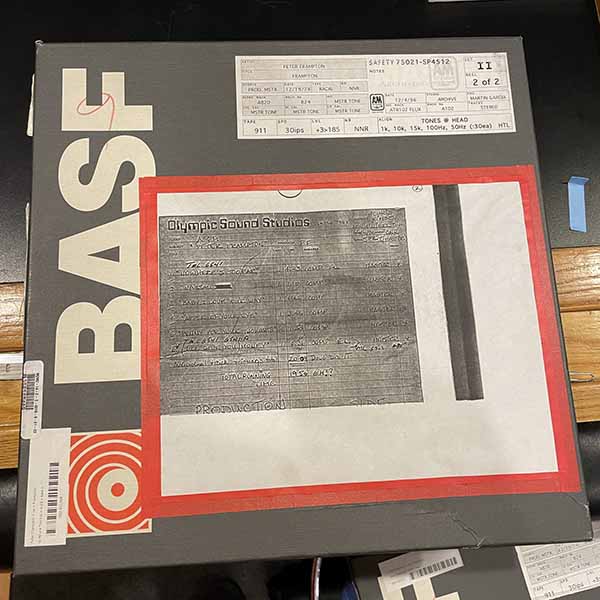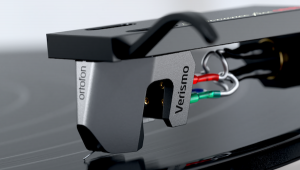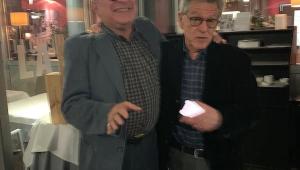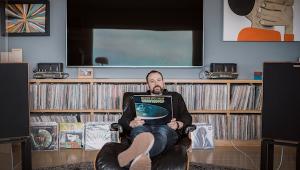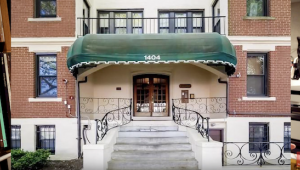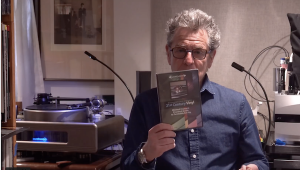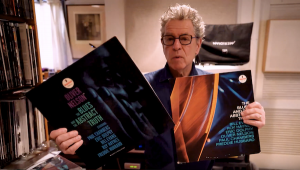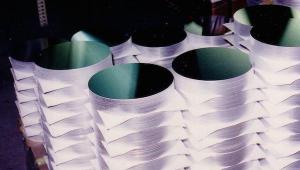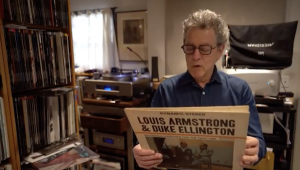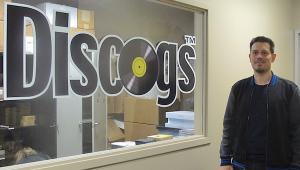Peter Frampton Tells Us Why the All-Analog Route Is the Only Way to Go When It Comes to Reissuing His Catalog on Vinyl
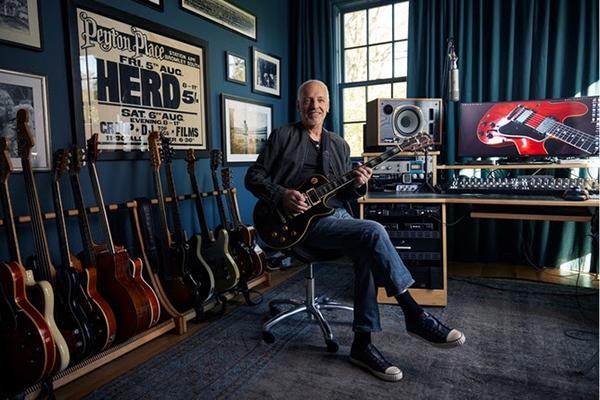
You can’t keep a good man down, especially when his name is Peter Frampton. It’s no accident Frampton’s current 27-date summer tour is titled — semi-tongue-in-cheek, mind you — Never Say Never. The legendary British guitarist/vocalist had intended to retire from the road for good following his extended runs in 2021-22 that were dubbed “Finale: The Farewell Tour,” mainly due to the Inclusion Body Myositis (IBM) that had been affecting his motor skills — but both his mind and his body had other plans.
After the last eight Finale shows in Europe in November 2022 and one ensuing local show in Nashville, Frampton found he had more gas left in his live tank. “I thought. ‘Well, I’m still enjoying playing. It’s a little different.’ It’s just as the jazzers always used to say as they got older — you gotta adapt,” he admits. “My band can’t tell the difference — or so they tell me — and I’m a little worried about them. But, like I would say that at the end of each of the Finale shows, ‘There’s always hope,’ and we have to enjoy every day we can.” (If you want to catch Frampton doing his live thing this summer run, go here to see those dates, which continue onward and upward this week.)
While Frampton continues to adapt his current onstage approach, he is also on the cusp of the release of a historical new box set on July 28 via Intervention Records — namely, the all-analog Frampton@50: In The Studio 1972-1975 180g 3LP numbered, limited edition box set that tops out at 2,500 copies. (We first reported on this important all-analog release here on AP back on March 22.)
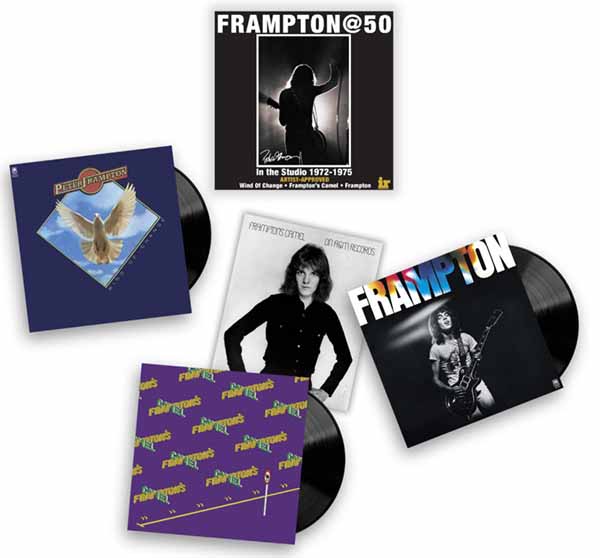
To briefly recap it: Frampton@50 comprises three key albums from Frampton’s early solo career on A&M Records, following his departure from Humble Pie — namely, July 1972’s Wind of Change, May 1973’s Frampton’s Camel, and March 1975’s Frampton. These 180g LPs have been “100 percent analog mastered” by Chris Bellman at Bernie Grundman Mastering from the “best-sounding” (their words) analog tape sources available, and they have been pressed at Gotta Groove Records in Cleveland, Ohio.
There were some questions as to why Frampton’s March 1974 LP Somethin’s Happening wasn’t included in this collection, so Intervention’s major domo, Shane Buettner, shared the reasons why with us directly, not long after the box set’s official announcement.
“I never intended this as a completist set — hence, it’s called In the Studio 1972-1975 and not The Complete Studio Albums, or something like it,” Buettner told us. “I did the three albums I thought absolutely essential to track Peter's growth from Humble Pie to solo superstardom.”
Buettner is open to revisiting the idea of releasing Happening on vinyl, however. “All of the experiences I’ve had with the A&M catalog team suggest there are viable tape sources for it,” he continued. “For this project, we had several sets of tapes to evaluate — some from the 1990s-era A&M Safety Program, and others contemporaneous to the ’70s. So, no, it wasn't a question of tapes not being available. If there is enough demand, we may very well revisit this decision and do Somethin’s Happening at a later date as a standalone. I’m sure Peter would be up for it!”
Frampton is indeed up for it, as you’ll see later on in the interview that follows. He’s also been working on some new material to follow-up his most recent two studio LPs, June 2019’s All Blues and April 2021’s Frampton Forgets the Words. “Every time someone says, ‘Well, when are you gonna do it?’ I say, ‘Well, when I’m ready.’ What’s the rush? I don’t have the definitive tracks that I’m looking for yet. I’ve got plenty to start with, but I need the right inspiration to come up with the rest of them I need.”
During a recent Zoom interview from his Nashville homebase, Frampton, 73, and I discussed his hands-on approach with the test pressings for what ultimately went into the Intervention Records box set, how he’d like to see his iconic 1976 double-live album Frampton Comes Alive! make it back to vinyl, and the one album in his catalog he’d rather not be reissued on vinyl at all. White top, white tails, never fails / Must have been a dream I don’t believe where I’ve been / Come on, we gonna do it again. . .
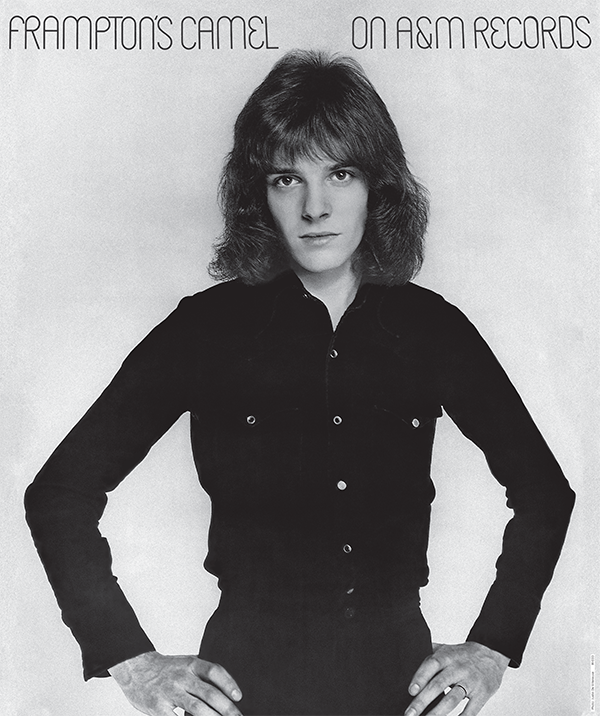
Mike Mettler: You actually went back and listened to some of your old albums on vinyl to get ready for the Never Say Never tour, right?
Peter Frampton: Yes. Rob Arthur, my keyboard player, bandleader, and partner in Phenix feature films — we have our own little thing — we went through all the vinyl releases that are coming out, and also my other albums. We covered a lot of ground, and listened to a lot of stuff. I think we pulled out about eight tracks that we either haven’t done live in years and years, or some we’ve never done before.
Mettler: Can you remind me about the gear you have in your listening system again? If I remember correctly, it includes a Bryston amplifier.
Frampton: Yeah. I’ve also got a Parasound [preamp], and I’ve got the Technics [SL-]1500 turntable that Chris Robinson of The Black Crowes told me about. We were speaking on the phone and he said, “So, what have you got?” This was like two or three years ago — maybe longer He said, “What turntable do you have?” I said, “Well, what should I get?” He told me about that Technics model, so I looked it up — and, yeah, It’s really good. And then I go into input seven and eight of my Apollo [interface], and then I come out and go through the Bryston [amp]. And I’ve got two Tannoy speakers as well.
Mettler: When you first got that Technics turntable hooked up, do you remember the first record you played on it? I already know what it was, but you should say it, not me. (chuckles)
Frampton: Oh, you want me to tell you? Okay! (laughs) Yeah, it was my 1967 mono Sgt. Pepper [by The Beatles]. You see, the thing is, I bought that album a week before it came out, because we went to Petticoat Lane up in London the weekend before it came out. Some guy had ripped off a truck, so I got it. (chuckles)
Mettler: Ah, so that’s how it works. (more laughter)
Frampton: I had the mono one, and then Graham Nash invited me — well, I used to go over to his place in Hampstead when I was in The Herd, because we played together [when Nash was with The Hollies] — and he said, “You want to hear Sgt. Pepper in stereo?” And I went, “Oh my God!” But, in that case, he had to play it off a Revox reel-to-reel [player], with headphones on. We had to take turns listening, because we didn’t have two pairs of headphones! (laughs heartily)
Mettler: What an amazing experience that must have been. As a fellow vinyl connoisseur, what makes vinyl the best way to listen to music in your opinion, Mr. Expert?
Frampton: Well, I mean. . . (slight pause) There’s just this — because it’s a record player and a needle on vinyl that is cut into grooves, it’s the epitome of analog. You can’t get any more analog. I suppose you could put one of those old 78 needles, but there were no diamonds in those days — it was just “vibrated” by this sort of needle thing, you know? There’s something about this inefficiency — and I will use that term — of vinyl that somehow creates this warmth that you just will never get out of a CD, or an SACD. You can try, but vinyl — it’s just something else.
These days, nothing has EQ on it, you know? At least you had the record player that you opened up and had a volume control that was also the on/off switch, and you had a tone control. And then you would have components like Marantz [integrated amps] to add in. But now, basically, I just put it [the LP] on and it goes straight to the Parasound and straight into my Apollo, and I don’t do any EQ at all. It just comes out how it’s supposed to sound.
Mettler: Let’s talk about the upcoming Intervention Records box set, Frampton@50. How did that come about? How did Shane [Buettner] present that idea to you?
Frampton: Oh yes — Mr. Detail! So, I guess before he came to us, he went to UMe and saw there was a potential for a lease deal for three albums — not four. For this deal, there was no Somethin’s Happening [Frampton’s aforementioned March 1974 LP]. Out of the four options, I would’ve chosen those other three too — but hopefully, there’ll be more.
After he got the okay from Universal, he came to us and asked if we would like to do this, and would we be involved? And I said, “Oh my goodness. Yes, yes, yes — on every level!”
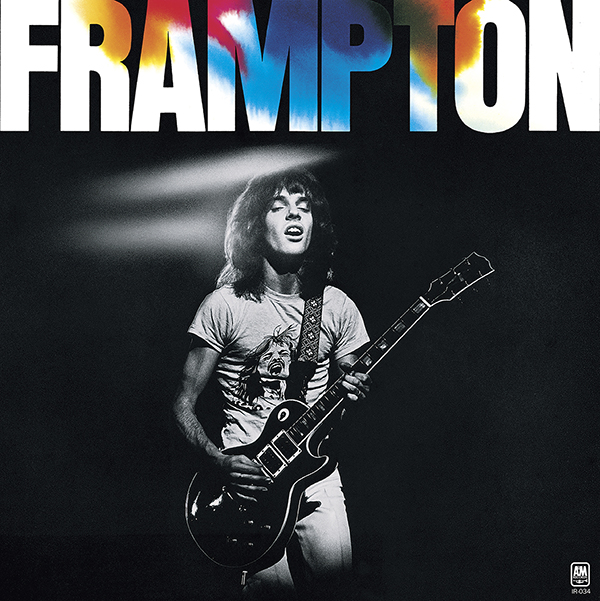
So, I get the test pressings — but before I even hear the Frampton one, he tells me he didn’t like it. He’s already gone, “No, there’s something here.” He knew, before he even sent it to me — he said, “It’s not kicking like I want it to. It doesn’t quite have the oomph the original one did.” He sent it to me anyway, but he said, “Don’t listen to it. Wait for the next one.” But I did listen to it — and it was good. I mean, it was really good, but I could see what he meant. I got both test pressings from him, both the old and the new — and, dammit, he got it even better! (chuckles)
And then, with getting the colors right on the covers, we went back and I said, “You’ve gotta get the English originals, especially for [May 1972’s] Wind of Change.” So, he did — for that one, and for [May 1973’s] Frampton’s Camel. And then, [March 1975’s] Frampton, I think, was more American.
Basically, he just then sent all these different versions of the different colors and everything, and it just came out so fantastic. But then we decided, “Are we chasing our tail here?” — in as much as, “Are we trying to make the new ones look like old ones? Faded old ones?” (chuckles) But he actually found the company that did all that and the colors that they used, which blew my mind.
So it’s as close to Wind of Change as it came out in ’72. If you brought it in ’72, it’s gonna look like the one that’s just coming out.
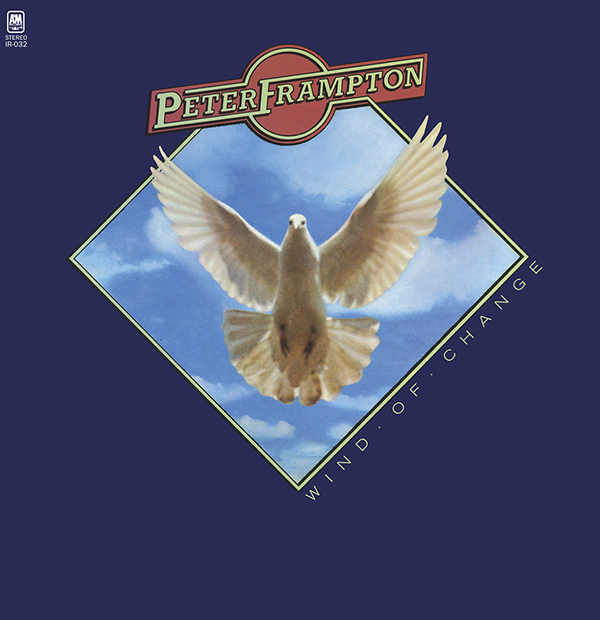
Mettler: Yeah, that’s great. And I do have to say that my own original of Wind of Change — which I didn’t buy in ’72, but still — it’s got that classic ringwear halo on it because it just wore out. So, I wanna have a nice, fresh copy of it. That new/old blue just feels right to me whenever I look at it.
Frampton: Yeah, I get it.
Mettler: Was there one song on Wind of Change that, when you first heard the test pressing, you were like, “This is the right thing that I recall hearing at that time,” or just something that gave you hope you guys were on the right track?
Frampton: Yeah. That was the second album [test pressing] I listened to, but the track on there that just sounds so great — and though I’m pleased with all of them — but one of my favorites from that album is “All I Want to Be (Is by Your Side)” [Track 1, Side Two).
And then, on Frampton’s Camel, pretty much all of them! (chuckles) It’s a very favorite album of mine, but “I Got My Eyes on You,” the opening track, is so funky — and, well, we’re gonna try that one out this summer.
Mettler: I look forward to hearing how you do that one live, for sure. For whatever reason, I’ve been paying closer attention to some of the acoustic textures of songs that have gotten maybe more electrified over the years onstage. Any of those acoustic “feels” stand out to you more now, or any you feel more connected to?
Frampton: Yeah — “Which Way the Wind Blows” [Track 4, Side One of Frampton’s Camel]. When I left Humble Pie, I had always wanted to get a pre-war 1939 Martin D45, but I couldn’t afford one! (laughs) So, I got a brand new 1970 Martin D45, and that’s what’s on all the acoustic stuff I did.
Mettler: Wow. Of course, I happen to love the videoclip that all you guys did where Shane and Chris Bellman are sitting there together behind the board, talking about how the box set came to be. I also love that we get to see the actual tapes that show us you’re doing analog here the right way. That’s gotta feel good for you too.
Frampton: Yes, absolutely. Absolutely! And there are a few other albums where it will be nice to actually find the multitracks and remix them, you know?
Mettler: Can we project a little bit here? I mean, since Somethin’s Happening wasn’t part of this collection because you could only do three, would you like to see that album come out next? Personally, I’d love to hear an all-analog Happening track like “I Wanna Go to the Sun” on 180g Intervention vinyl, for example.
Frampton: Yeah, me too, because that’s a favorite of mine. That one was done during not a very prolific time. We were working so hard touring that there’s only, I think, eight tracks on that album.
Mettler: Yeah, you’re right. It’s an eight track album, with four songs per side.
Frampton: Yeah — and it should have had more tracks, but we just didn’t have time. We were just in the studio, and right out back on the road.
Mettler: I get it. Your schedule in those days between ’72 to ’76 was crazy. It was just, you know, go, go, go.
Frampton: Yeah, and I used to be much taller, but I wore my legs down. (both laugh)
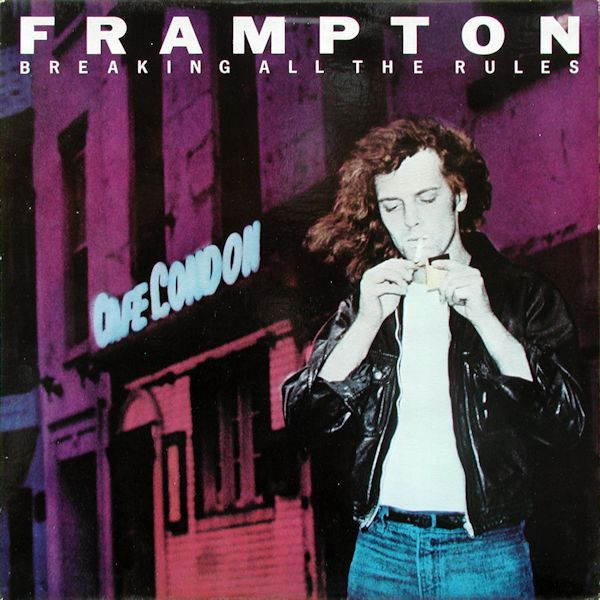
Mettler: Well, that’s what can happen when you keep leaning over your guitar to play all those riffs like you do. (more laughter) Another album I’d love to see you do on vinyl again is, I would love to get an update of [May 1981’s] Breaking All the Rules myself.
Frampton: Well, there you go! Yeah, that was a good record too. I like that record — a lot.
Mettler: I’m glad to hear that, because there’s a whole period of your album releases in the early/mid ’80s people just might not be all that aware of. And it sounds to me like, as long as you find the analog tapes for the ones you want to release, then you’ll do it. So, with that in mind, is it fair to say this Intervention box set is just the door opening on what will come?
Frampton: I think so. it all depends on the licensing, obviously, as to what’s feasible. But the obvious goal is to one day grab ahold of [Frampton’s truly iconic January 1976 2LP live set] Comes Alive! and remaster that again — the first mixes, not the later ones. Go back to the original, and remaster that for vinyl again.
Mettler: Oh yeah, I’m all for that. We’ve only got, what, three years to go for a 50th anniversary for that one, since Comes Alive! was a ’76 release.
Frampton: That would be great. That would be perfect for them to do it then. I’m so thrilled to be working with Shane because he’s a perfectionist, and I kind of agree with that way of life. (laughs heartily)
Mettler: Having Chris Bellman working on these reissues also helps. You’ve worked with Chris in the past, right?
Frampton: Oh, yeah! I’ve known Chris for so long. A wonderful, wonderful technician.
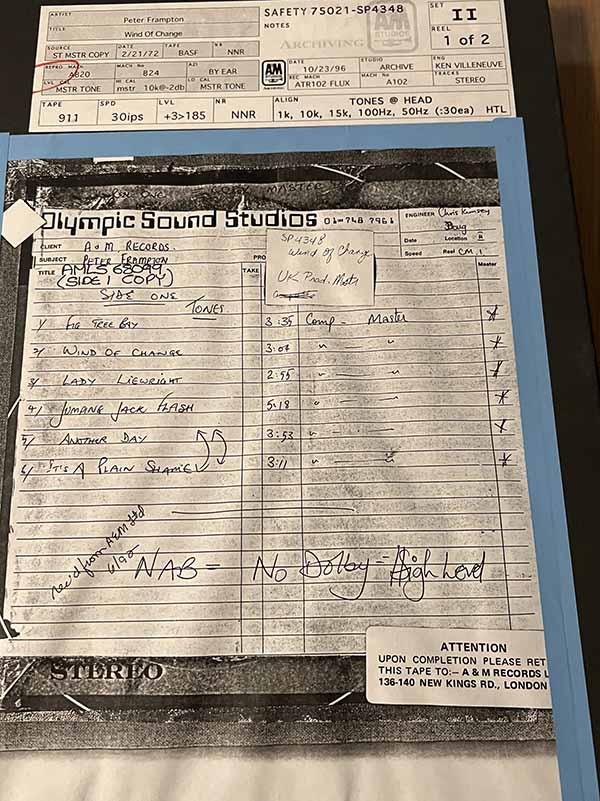
Mettler: You’ve worked with so many great engineers over the years. Can you give me some quick thoughts about who some of your favorite audiologists are, in that regard?
Frampton: Well, Bob Ludwig, obviously — and he’s retired! I think everyone was going, “Please, please, before you retire. . .?” I’ve known Bob and have been working with Bob ever since we lost Doug Sax [who passed away in 2015] — and actually before we lost him, I had moved over. But Chuck Ainley is my favorite engineer of all time. My very first engineer was Glyn Johns, so I kind of started at the top, as I always say. (both laugh)
When you are tracking, you’ve got your own little mixer with the headphones. And you’ve got echo on there, and it sounds pretty damn good in the headphones. Over the years, you’d come in the control room, and you’d listen. You’ve been blasting it in your ears, right? — and it sounds pretty damn good. And then they play it back and it sounds like this big, you know? (Frampton holds his hands far apart) And I would think, “That’s not what we just heard in here.” But with Chuck, and with all the good engineers from Glyn onwards like Chris Kimsey, you come into the control room. and it doesn’t sound as good — it sounds better than it did. And it should sound better in the control room speakers.
And Chuck, he’ll mix as he goes — that’s what most great engineers do. It’s like, once you come in and you’re doing the track, that’s basically the way the track’s gonna sound when he mixes it — and it’s so cool. It’s so cool.
Mettler: Is it fair to say, all things being equal, you’d go ahead and re-release everything from your catalog back onto vinyl, if you could?
Frampton: Yes. Yes. If I could re-put them out on vinyl — well, all of them except, um, what’s the one that I don’t like, out of all of them? The Art of Control [released in August 1982]. It’s a very mixed-up record. I think it was realizing that I hadn’t moved on with everybody else. It was punk; it was this and that, and I — I didn’t like that record.
Mettler: Well it was kind of an in-between record for you, until you got to Premonition [released in January 1986]. Maybe you could revisit some of those Art of Control songs for a future Record Store Day release, or something like that.
Frampton: Yes. Yes, I should do that.
Mettler: Works for me! Well, since we’re running out of time here, we’ll wrap it up with the 50 theme because Never Say Never is a “50” kind of tour, as I’ve seen that number being used with it, and the Intervention box set has a 50 on it too, so what I’d like to do is this. I’m gonna throw us 50 years into the future, so it’s 2073. Unless there’s some weird science going on, I don’t know that you and I are physically on the planet then.
Frampton: Oh, wow. No, probably not! (chuckles)
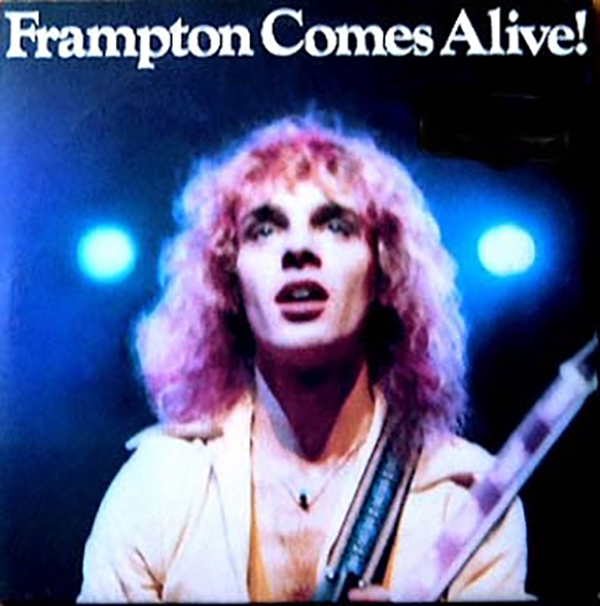
Mettler: However people are listening to music in that year of 2073 and they type in “Peter Frampton,” what do you want them to get out of that listening experience?
Frampton: Well, I think it would be like this — it seems to have been proven that no matter whether your bought Comes Alive! in ’76, or you bought it in ’96, or you bought it yesterday; it could be a 15-year-old or a 35-year-old who’s never heard it before. I take such pleasure in seeing those things [online] when they play people the music, and they film them listening to something for the first time. Watching people listen to “Do You Feel Like We Do” or “Lines on My Face” from Frampton Comes Alive!, they start off like this (nods politely), and then, by the chorus of “Do You Feel,” they’re smiling, you know? And when the talk box comes in, it’s like (gives wide-eyed response) — it’s just so amazing. It’s grandchildren now who are listening to it for the first time, and loving it!
I don’t know why, but I just think that what we did capture there on Comes Alive! was something that was — you caught us enjoying ourselves. I think you can tell the difference when a band is just playing by numbers, as opposed to involving the audience as well as having great playing. It’s a live show, so it’s the combination of the two, I think. We caught some special nights there.
The Frampton@50 box set (SRP: $159.99) can be pre-ordered directly from Intervention Records here.
Additionally, Frampton’s own official webstore has an exclusive allocation of 250 Frampton@50 vinyl box sets that include an autographed version of the Frampton's Camel promo poster, with the proceeds benefitting the Peter Frampton Myositis Research Fund. This SRP for this special version of the box set is $259.00, and it can be pre-ordered here.

PETER FRAMPTON
FRAMPTON@50: IN THE STUDIO 1972-1975
LIMITED EDITION BOX SET
180g 3LP (Intervention Records)

WIND OF CHANGE (1972)
Side One
1. Fig Tree Bay
2. Wind Of Change
3. Lady Lieright
4. Jumping Jack Flash
5. It’s A Plain Shame
6. Oh For Another Day
Side Two
1. All I Want To Be (Is By Your Side)
2. The Lodger
3. Hard
4. Alright
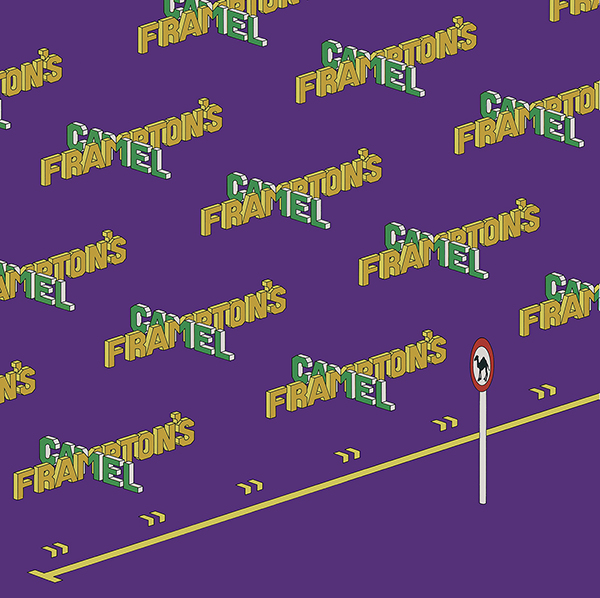
FRAMPTON’S CAMEL (1973)
Side One
1. I Got My Eyes On You
2. All Night Long
3. Lines On My Face
4. Which Way The Wind Blows
5. I Believe (When I Fall In Love With You It Will Be Forever)
Side Two
1. White Sugar
2. Don’t Fade Away
3. Just The Time Of Year
4. Do You Feel Like We Do

FRAMPTON (1975)
Side One
1. Day’s Dawning
2. Show Me The Way
3. One More Time
4. The Crying Clown
5. Fanfare
Side Two
1. Nowhere’s Too Far (For My Baby)
2a. Nassau
2b. Baby, I Love Your Way
3. Penny For Your Thoughts
4. (I’ll Give You) Money
